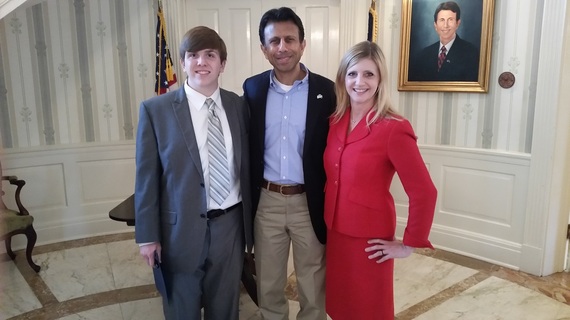On the morning of the 4th of July, I snagged a rare quiet moment on the porch while drinking my coffee. I thought about all the fun we were going to have later on that night when the kids blew up fireworks with their dad.
I thought about how the words "Independence Day" have changed for me over the years. How I have become more independent. How my daughter's independence is emerging as she becomes a young woman. Whether or not my son will be able to have his own Independence Day in the next few years in his own apartment, making his own bowl of potato salad and inviting us over for burgers.
I thought about all the things that make our country so amazing to me, up to and including the fact that we regularly have peaceful revolutions where those in power can quickly flip-flop. Or that a seemingly ordinary citizen can affect change for thousands of people in working to pass legislation.
Ever since I was a child, I've been advocating for one thing or another. Whether I was saving bunny rabbits from greyhounds in the third grade, promoting the use of alternative energy sources to improve the environment when I was in college or seeking to bolster women's rights as a young professional, my mother and father taught me how to use my voice.
Until 1998, politics was more of a hobby.
Then, my son Liam was diagnosed with autism and overnight my whole world changed.
His prognosis was grim that April day when we were told he would likely never speak again. He needed intense medical and behavioral treatments which at the time we paid out of pocket as best we could because they were not covered by our health insurance policy, despite the fact that they were prescribed by his treating physician.
We worked hard. He worked harder.
We were on a timeline so advocacy became as important as oxygen and working within the political system a passion.
We advocated for a better life for Liam, for his sister - Mairin, for our family and for other families living with autism. Finally, years later, we are beginning to see the fruits of our labor.
Liam is 18 years old now. Mairin is right on his heels at 16. They started going on trips to Washington, D.C. and our state capitol with me before first grade. I wanted them to know how to be the difference they wish to see in the world. I wanted them to affect change for their own lives and realize that in doing so they could impact the lives of others.
Slowly but surely, they are beginning to comprehend what all those trips have meant.
A few weeks ago, Mairin accompanied me on yet another trip to Washington, D.C. She had on a little professional suit this time and she is a kid, but that shouldn't fool anyone. She is a strong advocate.
When a Capitol Hill staffer asked if she was having a good time in D.C., Mairin responded:
I love coming to this city -- but when I am here, I work. Hard. I need to change things for the future for my brother and for myself. I plan to be a mother one day and I know there is a good chance I will also have to care for my brother throughout his life at some level. We need a national plan to address all of the issues in the autism community. You have the power to make that happen.
She will keep going back until they do.
Back home in Louisiana a week later, Liam was able to witness a bill he had testified in favor of before the Louisiana State Senate Education Committee on May 22 as Governor Jindal signed it into a new law. Louisiana Act 833 -- sponsored by Representative John Schroeder and led through the Senate by Senator Dan Claitor -- impacts Liam's immediate future by allowing IEP teams to adjust the strict cut-off limits for standardized testing required by our state to obtain a high school diploma.
This was important to Liam because hitting the number 688 doesn't completely define him as a person. He works incredibly hard and despite that initial grim prognosis of never being able to communicate again, he is a mere 20 points away from being on grade level with his peers. He has almost closed the gap. Obtaining an actual high school diploma will increase his opportunities for higher education and future employment. Future employment gives him a better chance at an independent life as an adult.
Holding him back to repeat grades has been detrimental and led to intense bullying, which has led to depression. He isn't lazy. He wants to earn his diploma just like he has earned everything else in his life. He wants to achieve. He wants to do his best.
This time it was his turn to talk and he had a lot to say. This is what he told the senators in committee that day:
I have a 3.2 grade point average in regular education classes. I almost have my Eagle Scout rank in Boy Scouts. I have held a job at McDonald's for the last two-and-a-half years and I have saved almost $3,000 in the bank. I am a good kid and I have worked very hard to be able to do all of these things. There are a lot of kids my age that have not done these things who are going to graduate from high school this May.
Here he is giving his testimony before the committee.
Before July 1, 2014, the state deemed Liam as a failure for being 20 points short. But on that day, he was able to witness change that he directly contributed to that will allow him to graduate with a real high school diploma and have a better chance to live on his own and invite us over to his place to celebrate holidays.
He seized the opportunity. He changed his own future.
You don't have to be a grown-up to advocate. You have to care about something and, most importantly, you have to act on it. So teach your children well. Get them involved in whatever issue is central to your life. Show them how to take action. Advocate on their behalf and make a difference.
Then when they are adults, they will follow in your footsteps and continue to make the world a better place.

